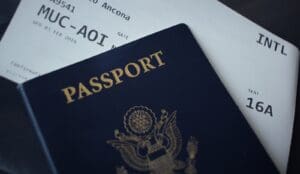
Psychologists have identified a new phobia, an extreme or irrational fear in which individuals may experience or panic at the thought of being without their smartphone. Psychologists have named this fear “nomophobia.”
For many people, disconnecting from technology — particularly, their smartphone — is a way to help them relax. It allows one some quiet time without interruption or distraction.
However, recent studies have found that approximately 75% of children and 70% of adults use electronic devices in bed or in their bedrooms. Many sleep specialists recommend creating a technology-free environment to achieve better sleep.
Psychologists have found that there is one particular group of people that instead of achieving relaxation from disconnecting from their electronics the opposite happens. For these people, separating from their smartphones increases their anxiety and brings about feelings of dread or panic. It manifests a specific fear that psychologists have now concluded to be a legitimate phobia.
Read More: Easy Ways to Reduce Anxiety Naturally
Nomophobia Officially Recognized Phobia
The term was coined in 2008 and identified as a diagnosis and a 2019 study published by the National Institutes of Health (NIH). The term nomophobia is derived from NO MObile PHone PhoBIA.
Nomophobia has now been officially classified as a psychological condition in which people have a fear of being detached from mobile phone connectivity, according to the NIH.
Psychologists say there are various psychological factors involved that occur as a result of the overuse of mobile phones. Two of the most common are low self-esteem and an extrovert personality. However, other mental disorders such as social phobia, social anxiety, and panic disorder may also precipitate nomophobic symptoms.
Researchers say that data from numerous surveys indicates that young adults are more likely to be addicted to mobile phones and affected by nomophobia. One survey found that 77 percent of teens reported anxiety when they were without their mobile phones.
What’s Leading to the Rise in Nomophobia?
Approximately 89% of adults say they check their phone within 10 minutes of waking up, according to a study by reviews.org published in 2022. In addition, 45% of Americans called their mobile phone their most valuable possession. More than half said their mobile phone would be the first thing they say if their house caught fire.
Several global studies have shown that this is a worldwide problem. It is estimated that approximately 21% of the adult population suffers from severe nomophobia. Around 71% of the population has moderate nomophobia. Younger people are likely to be affected most, with studies showing that among college and university students there is a 25% prevalence of nomophobia.
Researchers say that nomophobia is part of a larger trend called technophobia that will continue due to technological advancements. The researchers concluded that mobile phones have filled the vacuum that has occurred in society due to rapid urbanization, migration, increasing numbers of nuclear families, and disintegration of the social fabric.
Through mobile phones and social media, we are connected with others nearly all the time. This gives us both a sense of security and social control. Even when sitting next to people, the mobile phone can have us a thousand miles away giving us a connection with others.
Signs & Symptoms Nomophobia
Common signs and symptoms observed in people determined to have nomophobia include anxiety, respiratory alterations, trembling, perspiration, agitation, disorientation, and tachycardia.
Scientists propose that certain psychological predictors indicate potential nomophobia in a person. These include self-negative views, younger age, low esteem, self-efficacy, high extroversion/introversion, impulsiveness, and a sense of urgency and seeking.
However, psychologists and physicians warn that diagnosis isn’t always straightforward as nomophobia shares common clinical symptoms with other disorders. Some mental disorders can precipitate nomophobia or vice versa. Physicians emphasize that it’s very difficult to differentiate between whether mobile phone addiction or existing anxiety disorders make a person nomophobic. For these reasons, physicians say a diagnosis of nomophobia should occur through exclusion.
Treatment for Nomophobia
People suffering from nomophobia may be helped by therapy to address the symptoms. A therapist might recommend cognitive behavioral therapy or exposure therapy. A program of detoxification may also be recommended by a doctor, psychologist, or therapist. This might include a series of steps such as:
- Turning your phone off one hour before bed and during the night.
- Keep your phone put away and do not check it during meals.
- Watching an entire movie without checking your phone for messages.
New Advances in Identifying Nomophobia
Researchers have developed a test that is designed to assess and diagnose nomophobia.A test using a self-report measure was developed through a study by computers in human behavior and published in the journal ScienceDirect.
Forbes published some of the questions used in this self-report measure, shown below.
Series of Questions #1
Individuals rate each statement on a scale from “strongly disagree” to “strongly agree:”
- I would feel uncomfortable without constant access to information through my smartphone.
- I would be annoyed if I could not look information up on my smartphone when I wanted to do so.
- Being unable to get the news (e.g., happenings, weather, etc.) on my smartphone would make me nervous.
- I would be annoyed if I could not use my smartphone and/or its capabilities when I wanted to do so.
- Running out of battery in my smartphone would scare me.
- If I were to run out of credits or hit my monthly data limit, I would panic.
- If I did not have a data signal or could not connect to Wi-Fi, then I would constantly check to see if I had a signal or could find a Wi-Fi network.
- If I could not use my smartphone, I would be afraid of getting stranded somewhere.
- If I could not check my smartphone for a while, I would feel a desire to check it.
Series of Questions #2
If I did not have my smartphone with me:
- I would feel anxious because I could not instantly communicate with my family and/or friends.
- I would be worried because my family and/or friends could not reach me.
- I would feel nervous because I would not be able to receive text messages and calls.
- I would be anxious because I could not keep in touch with my family and/or friends.
- I would be nervous because I could not know if someone had tried to get a hold of me.
- I would feel anxious because my constant connection to my family and friends would be broken.
- I would be nervous because I would be disconnected from my online identity.
- I would be uncomfortable because I could not stay up-to-date with social media and online networks.
- I would feel awkward because I could not check my notifications for updates from my connections and online networks.
- I would feel anxious because I could not check my email messages.
- I would feel weird because I would not know what to do.









